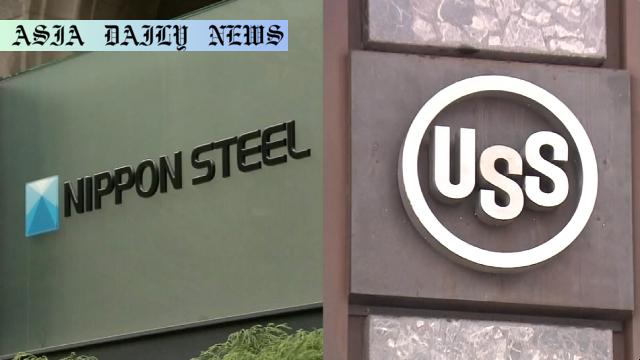Nippon Steel celebrates as Trump clears $11 billion partnership with US Steel for manufacturing and domestic production reforms.
- Nippon Steel’s $11 billion deal for US Steel gains Trump’s approval.
- A National Security Agreement ensures governance and production commitments.
- The US government receives a ‘golden share’ for vetoing key decisions.

Nippon Steel’s Acquisition of US Steel: A Milestone Decision
The steel industry has witnessed a historic step forward, as Nippon Steel, a leading Japanese corporate player, received the green light for its $11 billion acquisition of US Steel. This development was made possible through an agreement endorsed by US President Donald Trump, overturning the previous administrative hurdles imposed by the Biden government. Nippon Steel’s aim to purchase 100 percent of US Steel’s common shares and incorporate it as a wholly owned subsidiary is now becoming a reality, promising to invigorate the American steelmaking sector.
Both companies have entered into a National Security Agreement (NSA) with the US government. This agreement underscores that approximately $11 billion in new investments will be injected by 2028, aimed at bolstering steelmaking infrastructure and innovation. The NSA also includes specific commitments related to governance and domestic production, further emphasizing the strategic importance of this partnership for ensuring the global competitiveness of American manufacturing.
Governance Commitments: The Role of the ‘Golden Share’
A unique aspect of the deal is the issuance of a “golden share” to the US government. This provision empowers the government to exercise direct oversight by vetoing crucial management decisions related to US Steel’s operations. The golden share serves as a safeguard, aligning national security considerations with corporate actions. It also ensures a close-knit collaboration between the government and Nippon Steel, fostering an environment of trust and mutual benefit. Consequently, this move is being viewed as a model for striking a balance between foreign investments and domestic interests.
Furthermore, both companies have firmly committed to reshoring critical manufacturing operations and adhering to American trade policies. This underscores the partners’ readiness to contribute significantly to the resurgence of American steelmaking while maintaining the economic sovereignty essential for a robust industrial strategy.
A Strategic Shift for the US Steel Industry
The approval marks a significant turning point for the US steel sector, which has faced challenges like global competition and fluctuating demand. With Nippon Steel stepping into the arena, industry experts predict enhanced innovation and a revitalized workforce. By incorporating advanced Japanese steelmaking technologies and allocating substantial funds for infrastructure, the joint endeavor is expected to modernize production while adhering to environmental sustainability standards.
Nippon Steel’s commitment to prioritizing American manufacturing sends a clear message: global partnerships can thrive without compromising national interests. The $11 billion investment distributed over five years is a testament to their belief in the transformative power of this collaboration.
Reviving Confidence in Global Trade Alliances
This deal also sets a precedent for revisiting global trade dynamics. Trump’s administrative support demonstrates a departure from stringent national security constraints that had previously hindered collaborations. By allowing foreign partnerships to flourish under regulated conditions, this agreement revives confidence in the economic benefits of globalization while mitigating the potential risks tethered to national security.
The collaboration between Nippon Steel and the US government signifies an alignment of political leadership, industrial goals, and global economic aspirations. It also highlights the importance of strategic investments that enrich national prospects while welcoming international partners into the decision-making fold.



Commentary
An Opportunity for Transformation in the Steel Industry
The approval of Nippon Steel’s $11 billion deal to acquire US Steel is undoubtedly a transformative development in both the American and global steel industries. This partnership not only signifies the ushering in of advanced technologies but also breathes fresh confidence into a longstanding sector facing increased international competition. By leveraging resources from both nations, it’s poised to modernize American steel production in a manner not witnessed in decades.
Where this deal truly excels is in its framework. The inclusion of a “golden share” provision showcases a balance between embracing globalization and preserving national interests. By granting the US government oversight through this mechanism, concerns tied to security and national policy have been directly addressed. This blend of governance could act as a blueprint for managing future foreign investments in critical industries, fostering collaboration without ceding strategic control.
Prescient Investments for Sustainable Industrial Growth
Looking toward the future, the $11 billion investment promises a ripple effect not limited to steel. The improvement in infrastructure, employment opportunities, and the adoption of sustainable practices could influence allied sectors, showcasing the dominance of innovation-driven policy decisions. Nippon Steel’s focus on adhering to American trade policies and manufacturing ethics is also a fine narrative for responsible corporate leadership in an interconnected world.
The deal also provides a rare opportunity to realign domestic priorities with global aspirations. By reviving confidence in global alliances, this partnership has paved the way for overcoming policy bottlenecks that restricted industrial growth. The collaboration could potentially write a new chapter of proactive foreign investment, defining a new era of mutually beneficial relationships.